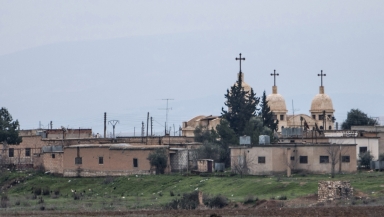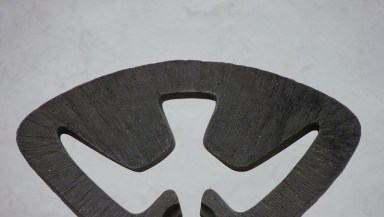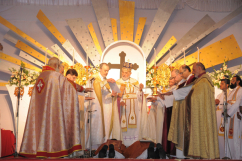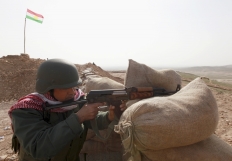
The kidnapping of 220 Assyrian Christians in Syria demonstrates "the brutality of IS [Islamic State]...without regard to any basic value of humanity," the UN Security Council said on Wednesday.
"Such crimes once again demonstrate the brutality of IS which is responsible for thousands of crimes and abuses against people from all faiths, ethnicities and nationalities and without regard to any basic value of humanity," the council said in a statement. It demanded the "immediate and unconditional" release of all those captured.
The number of those abducted from villages near Tel Tamr, south of the Khabour river, in Syria on Monday morning was initially estimated to be between 70 and 100, but the Syrian Observatory for Human Rights [SOHR] has now put the figure at at least 220.
Ablahd Kourieh, an Assyrian Christian who is deputy head of a Kurdish-led defence council in north-eastern Syria and an official in an Assyrian political party, told Reuters it was more likely even higher; between 350 and 400. "What is happening is a threat to our existence," he said.
He called for air strikes, and for the arming of Kurdish-led forces which are battling Islamic State militants in the region. He estimated that 3,000 Assyrians had fled from the villages for the main cities of Qamishli and Hasaka, where many are now sheltering in churches.
"We call for bombardment of the terrorists' positions there, and the provision of quality weapons," Kourieh said. He said there had been no contact with Islamic State, which has yet to claim the abductions.
SOHR reported on Thursday that US-led air strikes targeting IS fighters near Tel Tamr had begun.
A video was also published online today, apparently showing IS militants destroying a collection of priceless statues and sculptures dating back to the ancient Assyrian era.

The video showed men attacking the artefacts, some of them identified as antiquities from the 7th century BC, with sledgehammers or drills, saying they were symbols of idolatry.
"The Prophet ordered us to get rid of statues and relics, and his companions did the same when they conquered countries after him," an unidentified man said in the video.
The articles destroyed appeared to come from an antiquities museum in the northern city of Mosul, which was overrun by IS last June, a former employee at the museum told Reuters.
The video showed a large room strewn with dismembered statues, and Islamic songs played in the background.
Lamia al-Gailani, an Iraqi archaeologist and associate fellow at London-based Institute of Archaeology, said the militants had wreaked incalculable damage.
"It's not only Iraq's heritage: it's the whole world's. It's human heritage," she told Reuters.
"They are priceless, unique. It's unbelievable. I don't want to be Iraqi any more," she said, comparing the damage to the dynamiting of the Bamiyan Buddhas by the Afghan Taliban in 2001.
As well as Assyrian statues of winged bulls from Nineveh and Nimrud, Gailani said the Islamic State hardliners appeared to destroy statues from Hatra, a Hellenistic-Parthian city in northern Iraq dating back around 2,000 years.
Islamic State espouses a fiercely purist school of Sunni Islam, deeming many other Muslims to be heretics. They have destroyed Shi'ite and Sufi religious sites and attacked churches in the parts of Syria and Iraq under their control.
"Muslims, these relics you see behind me are idols that were worshiped other than God in the past centuries," the unidentified man in the Islamic State video said.
"What is known as Assyrians, Akkadians and others used to worship gods of rain, farming and war other than God and pay all sorts of tributes to them."
(Additional reporting by Reuters)

















